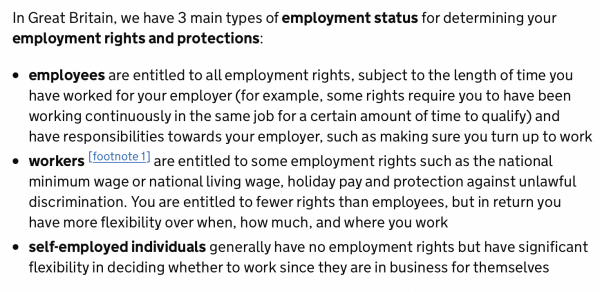Over recent years, more and more individuals have turned to the gig economy for work.
Definition Difficulties
In its most simple terms, the gig economy is where independent contractors or freelancers get paid for the ‘gigs’ or tasks they do, such as performing a delivery, rather than being paid a regular wage. Creating a more in-depth and accurate definition has proven somewhat difficult…
The Department for Business, Energy & Industrial Strategy (BEIS) (a now-disbanded government department), established a working definition of the gig economy in a 2018 report:
“The gig economy involves the exchange of labour for money between individuals or companies via digital platforms that actively facilitate matching between providers and customers, on a short-term and payment by task basis.”
However, Coadec has since argued:
“The term ‘gig economy’ has become synonymous with internet apps connecting customers with service providers. But the gig economy is much broader than this narrow definition, and it existed long before we ordered food or booked a manicure via apps on our smartphones. […The gig economy] is the process by which companies act as an intermediary between a customer and a person providing the service.”
This helps to highlight the difficulty of coming up with an accurate definition of the gig economy which everyone can agree upon. This leads us to the difficulty of deciding how to view and treat the gig economy; if it is this hard to reach an agreement on its very definition, how can we reach agreement on whether it is more flexible or exploitative, or whether these gig workers should be given full employment rights or left as they are?
The Flexibility of the Gig Economy
One of the main draws of gig work is the flexibility that comes with it. Gig workers have the right to pick and choose what work they take on. They have control over how much they work and when. This may allow gig workers to fit their work around their lives rather than fitting their lives around work.
This said, flexibility is not always a good thing. With flexibility comes irregularity: irregular working patterns, irregular hours and irregular pay. Workers won’t be earning a set amount of money every week, or month, making it harder to achieve financial stability.
Employers only have to pay workers when work is actually available, rather than paying continuous staffing costs even when the demand for their products or services is not there. This is good from an employer perspective, but here we can see that irregularity coming in for the gig workers: work is not a given.

Lack of Employment Rights
Gig economy workers are usually classed as independent contractors rather than workers.

Above is an extract taken from the government website regarding employment status and rights in Great Britain. Here, gig workers usually fall into the latter category of self-employed individuals who have no employment rights.
Therefore, gig workers often don’t have access to employment rights, such as (but not confined to):
- Minimum wage… BEIS’s NatCen Panel in 2017 found 25% of those involved in gig economy work reported earning less than the national minimum wage for over 25s at the time of the survey
- Protection from wrongful dismissal
- Right to redundancy
- Sick pay
- Holiday pay
- Paid parental leave
Supreme Court’s Ruling Against Uber
On 19th February 2021, the UK’s Supreme Court ruled that Uber must treat its drivers as workers rather than self-employed, meaning many are now entitled to minimum wage and holiday pay.
The court ruled that Uber must consider its drivers as workers from the moment they log on the app until the moment they log off.
BEIS’s NatCen Panel in 2017 found that Uber was the most commonly used platform by gig economy workers, with 18% having provided services via the app. This emphasises how huge a step this Supreme Court decision is in the way of gig workers gaining more employment rights, given the extent to which Uber uses gig workers to deliver its services.
What is the Extent of the Gig Economy?
So then, what is the extent of the gig economy? Just how popular is it?
In their 2018 report (using NatCen Panel data from 2017), BEIS estimated that around 4.4% of the Great British population had worked in the gig economy within the last 12 months, working out at around 2.8 million people.
Research commissioned by TUC in November 2021, carried out by the University of Hertfordshire with fieldwork and data collection conducted by Britain Thinks, found that around 14.7% of people in England and Wales work for gig economy platforms at least once a week. This is equivalent to 4.4 million people, which when compared to their previous figures, has almost tripled over the last 5 years.